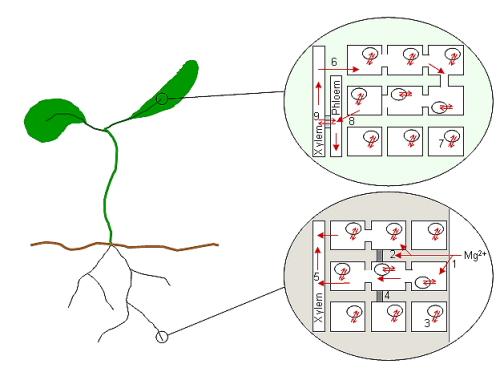Magnesium is an important element in the biological systems and essential mineral nutrient for life. Hence, it is present in almost all types of cells. The energy currency of our body ATP must bind to magnesium for its biological activity. Magnesium also plays a vital role in the stability of all phosphate compounds in the cells, and also important for the phosphate associated with the synthesis of DNA and RNA. Magnesium ion is essential for over 300 enzymes for their enzymatic activity. In plants, magnesium is essential for the synthesis of chlorophyll and hence, necessary for the process of photosynthesis.
The Function of magnesium in the human body:
Nerve impulse conduction:
Magnesium ion has the ability to close certain calcium channels, which are required for nerve cell activity. Hence with the excess of magnesium in our body, it can directly affect the cell membrane by decreasing the activity of the nerve cells.
General health:
Adequate intake of magnesium is very necessary for good health. Because of inadequate intake, some side-effects can be seen. It is associated with muscle spasm, high blood pressure, anxiety disorders, osteoporosis, etc. acute magnesium deficiency is known as hypomagnesemia which is quite rare. Excess of oral magnesium intake is also not suggested as it may cause diarrhea or any digestive problems. Magnesium orotate is used as adjuvant therapy in a patient with congestive heart failure. It increases the chances of survival and the quality of life.
Hypertension:
Magnesium is used for controlling high blood pressure. Pre-eclampsia which is a condition of high blood pressure experienced during pregnancy can be treated with magnesium sulphate.

Food sources of magnesium:
Magnesium is greatly available from green vegetable like spinach because they have an abundance of chlorophyll molecules and they contain the magnesium ion. Besides green vegetables seeds, dark chocolate, nuts, soybean, bran, and whole grains are also a good sources of magnesium ion.
Magnesium deficiency:
- In plants: In plants magnesium deficiency shows stress responses and the deficiency can be seen by the decrease in the rate of photosynthesis. This is because magnesium is the central ion of chlorophyll and chlorophyll is essential for photosynthesis. Magnesium deficiency also causes growth reduction and also affects the reproductive viability of plants.
- In animals: In animals, magnesium deficiency is known as hypomagnesemia. Symptom of hypomagnesemia includes balance problems due to muscle weakness.
Biological activity of magnesium:
- With chlorophyll: Magnesium is the central coordinating ion in the photosynthetic pigment chlorophyll. Hence, The Photosynthesis rate vitally depends on the concentration of magnesium ion in plants.
- With enzymes: Magnesium is required for more than 300 enzymes catalytic activity on our body. Hence it is necessary for many physiological processes of the human body.
- With ATP: Magnesium is essential for the activity of the main energy source of our body. ATP must bind with magnesium for its biological activity.
- With nucleic acid: Magnesium binds to nucleic acids such as DNA and RNA for the stabilization of their structure. Autocatalysis of many ribozymes is also magnesium dependent.
- In Ionic transport across the membrane: magnesium is vital in the maintenance of an electric potential across the cell membrane and it is also necessary for the transport of sodium, calcium, and potassium across the plasma membrane.